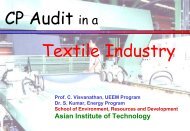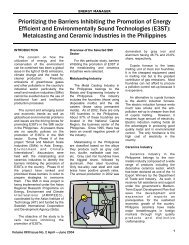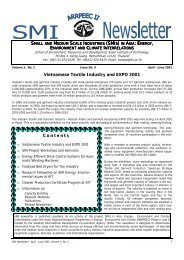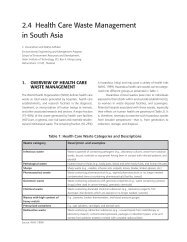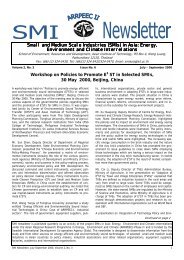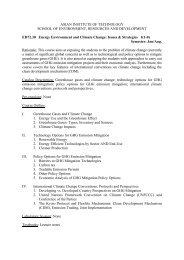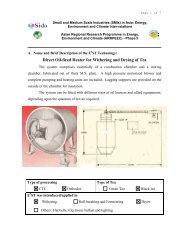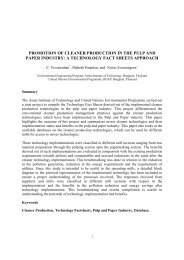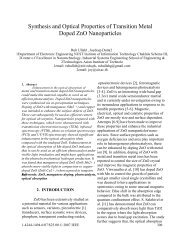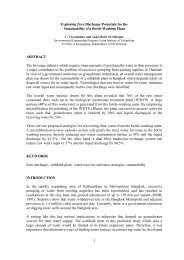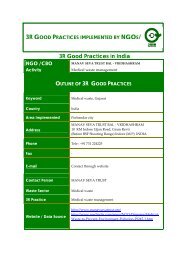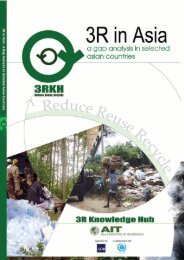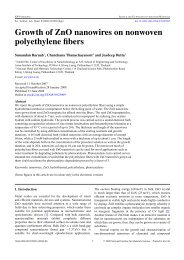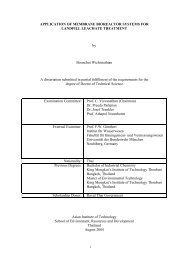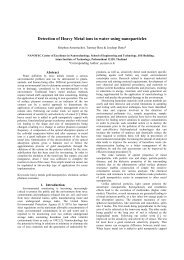Evaluation of Plastic Waste Management in Thailand Using Material ...
Evaluation of Plastic Waste Management in Thailand Using Material ...
Evaluation of Plastic Waste Management in Thailand Using Material ...
You also want an ePaper? Increase the reach of your titles
YUMPU automatically turns print PDFs into web optimized ePapers that Google loves.
From Table 3.2, the stakeholders were <strong>in</strong>terviewed are:<br />
- Government and private organizations: PCD, Department <strong>of</strong> Public Cleans<strong>in</strong>g <strong>of</strong><br />
BMA <strong>of</strong>fice, TIPMSE, PIT, TPIA, TPFRIA, Industrial <strong>Waste</strong> <strong>Management</strong> Bureau<br />
<strong>of</strong> DIW<br />
- <strong>Waste</strong> collector: waste shops, waste pickers and middle dealers<br />
- <strong>Waste</strong> generator and recycled product buyer: households<br />
- <strong>Waste</strong> recyclers: pelletiz<strong>in</strong>g factory, energy recovery plant, plastic to oil plant<br />
The tool is used to <strong>in</strong>terview stakeholders is a questionnaire. The primary data consist <strong>of</strong><br />
the current situation <strong>of</strong> Thai plastic <strong>in</strong>dustry and the overview <strong>of</strong> plastic waste management<br />
<strong>in</strong> <strong>Thailand</strong>. The field observations were also done to collect data related to the actual<br />
activity <strong>of</strong> stakeholder and recheck the secondary data. The questions <strong>in</strong> questionnaire<br />
differ <strong>in</strong> each key person and key organizations, and the lists <strong>of</strong> questions are presented <strong>in</strong><br />
Appendix B.<br />
3.5.3 Data analysis for stakeholder analysis<br />
Stakeholders <strong>of</strong> plastic waste management <strong>in</strong> <strong>Thailand</strong> were listed and filled <strong>in</strong> stakeholder<br />
table (see Table A-11 <strong>in</strong> Appendix A). Information <strong>of</strong> each stakeholder was reviewed from<br />
secondary data, and the <strong>in</strong>formation from primary data collection was then added more <strong>in</strong><br />
stakeholder table. After fill<strong>in</strong>g stakeholder table, all parameters were analyzed, and<br />
analyzed data were presented to complete stakeholder analysis.<br />
The power and leadership analysis present the importance <strong>of</strong> each stakeholder.<br />
Stakeholders are divided <strong>in</strong>to four groups referred to page 11. Then, the level <strong>of</strong><br />
stakeholder knowledge and power/leadership <strong>of</strong> stakeholders are analyzed together. The<br />
different level knowledge can present that stakeholders understand and can or cannot<br />
operate the project by apply<strong>in</strong>g their knowledge.<br />
3.6 Develop <strong>Plastic</strong> <strong>Waste</strong> <strong>Management</strong> Options<br />
3.6.1 Data collection<br />
Primary data collection was collected from questionnaire, <strong>in</strong>terview, and field observation.<br />
The questionnaire and <strong>in</strong>terview were used at the field visit at transfer stations, waste shops<br />
(<strong>in</strong>formal and formal sectors), plastic production and recycl<strong>in</strong>g factory, plastic waste to fuel<br />
plant, and plastic to energy plant.<br />
The secondary data were collected from Thai organization, the websites, researches, books,<br />
and annual reports. The secondary data from these organizations will relate to the statistics<br />
<strong>of</strong> plastic wastes, plastic manufactures, recycl<strong>in</strong>g technology researches, and laws and<br />
policies. Moreover, the available secondary data <strong>in</strong> other countries were also searched and<br />
collected to complete this study.<br />
3.6.2 Propos<strong>in</strong>g scenarios<br />
There three different scenarios proposed were set to evaluate the plastic waste management<br />
situation <strong>in</strong> 2016 follow<strong>in</strong>g the National Environmental Quality Control Plan <strong>in</strong> 2012-2016<br />
(MNRE, 2013), the plastic bag taxation research <strong>in</strong> 2011, and Alternative Energy<br />
48



